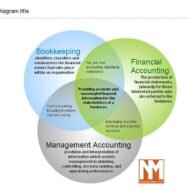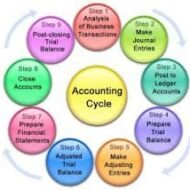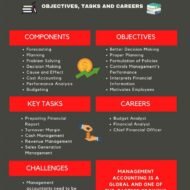Posted by Managementguru in Accounting, Financial Accounting, Financial Management, Management Accounting, Project Management, Training & Development
on Jan 21st, 2015 | 0 comments

What Does a Career in Accounting Demands for? Are you vying for a career in accounting field? Everybody envy accountants for there is a misconception that they are Demi-Gods. Though a good accounts manager can act like one who can save you from a dire situation by manipulating the accounts skilfully, the demands and challenges in this field are too high to be savored. Purchase Your Copy of “Careers with a Degree in Accountancy and Finance” at Gumroad So what does it take to become a reputed accounts man in your circle and also enjoy what you do! Self analysis is the best way to understand what you really want to be. There are certain traits characteristic to people belonging to this community. See if you are gifted with those attributes; if not, you can always train yourself to gain expertise. 1. Are you good at numbers– Mathematics, Yuck! If this is your reaction please quit reading this article as numbers play an integral role in accountancy. Figures, Figures and more Figures determine the profit and loss status of a company. If you are passionate about playing with numbers it goes without saying you are already a half accountant. The thrill of taking control and handling numbers make or break a company. Jackie Mansion jocularly puts it – “Did you ever hear of a kid playing accountant – even if they wanted to be one?” 2. Are you a good listener and can you read between the lines? A good auditor will allow the client to talk and listen to what he says. Then he tries to extract the exact kind of information he needs to make the ends meet. Empathy is an innate quality and if you are not going to be a good listener then please revise your consideration of becoming an accountant. Sometimes the client may not know what you wish to seek; it is your responsibility to frame simple questions in a language that he understands and pull out answers. 3. Can you avoid being temperamental? 90% of the time your clients are going to say “No” to whatever you suggest. Alas, it is not their fault; the corporate Bosses and CEO’s always aim big and most probably will not be aware of the consequences of their impulsive actions. They always think about clinching a deal and conveniently overlook the effects of their financial and corporate decisions on the account and subsequently on the accountant. For example cash has to be handled very carefully and every penny has to be accounted for properly. A bank cashier will know the importance of cash handling as it is very important for them to balance the inflow and outflow at the end of the day. For corporate firms, it becomes mandatory to reduce the cash dealings and account every transaction in the form of a check or electronic transfers like RTGS or NEFT or EFT. The point is, you should have the nerve to talk to a company’s head if he is planning for a bad move and suggest what could be done for the good of the company (Income tax and Sales purposes). 4. Are you wise when it comes to choosing clients? Whether you are a part time practitioner, Full time accountant, Accounts manager or Free lancer, do your homework before accepting the offer. Ultimately you need to see your payments coming through and nobody works here for a song. Big practitioners take a big cut half yearly or annually but if you are a part time accountant, it is always better to go for monthly payments or get paid after the completion of individual project s....

Posted by Managementguru in Financial Accounting, Management Accounting, Principles of Management
on Mar 27th, 2014 | 0 comments

Management Vs. Financial Accounting Management Accounting : The process of preparing management reports and accounts that provides accurate and timely financial and statistical information to the management Financial Accounting : The purpose of accounting is to provide the information that is needed for sound economic decision making concerned with classifying, measuring and recording the transactions of a business. What is Management Accounting: Management accounting is the updated version of what you call financial accounting and the most circulated term in corporate business arena. Management involves planning, organizing, staffing, leading and controlling the resources available in an organization, namely the physical and human resources. Much importance is given to personnel management as they are the priceless assets of any organisation.But it is equally important for a firm to record all its business transactions for future reference and tax audits. Thus the necessity of accounting comes into the fray. Financial Statements Made Easy Functional Difference: Well, accounting means something to do with finance. So, what is the big difference, if it is financial or management accounting? One difference is in the title, and the other in their function. The rationale behind financial accounting is statutory, done for the benefit of shareholders, customers, government regulatory agencies, other external agencies, potential investors and the like. It records all business transactions that are purely monetary in nature and no further analysis is done. Essential for Management Planning: Management accounting is voluntary and reports are prepared to meet the internal needs of management. We talked about planning, for which interpretation and analysis of such quantitative data and other inputs becomes necessary to plan for future needs of management. The main functions being attention direction and problem solving, management accounting is primarily concerned with providing information relating to the various aspects of a business, like cost or profit associated with some portions of business operations. It employs techniques such as standard costing, budgeting, marginal costing, break- even analysis and so on., Inputs also stem from industry data, competitor data, published reports by public and private agencies and research studies findings, thus widening its scope for improvement in business operations. Financial Accounting: Financial accounting is restricted to deal only with “generally accepted accounting principles” and any deviation is considered to be errors for correction. Though it provides valid and authentic information, it lacks timeliness. The former restricts the accountant to a mere book-keeper while the latter transcends the role of the accountant to that of total business information technologist. Here he becomes an evaluator of different functional areas like marketing, production, purchase and personnel. As modern business is huge in size, complex, diversified and decentralized in terms of operations, financial accounting just does not fill the bill, as information is required as when an event happens at various hierarchical levels of an organisation. This infographic from Goodaccountants.com details the industries that employ the most accountants and auditors, and the results are very interesting! Management accounting is inter disciplinary in character and derives inspiration from organizational theory, economics, behavioral sciences, statistics and management. Although the paraphernalia required for management reporting is complex and expensive, it is worth the try, as it tries to compare and contrast the actuals with the standards and bring out variances if any. This is quite useful in determining the cost-effectiveness of a particular project or to be prepared for suitable action. Management accounting is nothing but a management information system where the managers have to be techno-savvy in order to handle the total information resource and project it suitably to the management to take timely actions for the increase in growth, profit and sustainability of the...

Posted by Managementguru in Accounting, Financial Accounting, Financial Management, Principles of Management
on Mar 27th, 2014 | 0 comments

An Analysis to Understand the Art of Accounting Objectives of an Accountant: The pure objective of an accountant would be to record all business transactions that are monetary in nature, in order to ascertain if the company has earned profit or suffered loss during a financial year. The financial position of the company as on a particular date can thus be understood from the accounting journals and ledgers. We are talking about the conventional purpose of accounting. But with the lapse of time, more and more is being expected from accounting, in that, it has to meet the demands and requirements of tax authorities for the purpose of income tax and sales tax returns, government regulations, investors, owners and the management. Thus it can be aptly defined as the art of recording, classifying and summarizing events in a significant manner, that involve money transactions and/ or events that are of financial character, for interpretation. Systematic records for future reference: Book keeping is an accounting practice that tells us how to keep a record of financial transactions. A firm deals with its customers and suppliers, where numerous business transactions take place every day. It is not possible for us to remember every transaction, which we might need it for our reference at a future date. Especially, if it happens to be a credit sale, definitely the necessity of systematic book keeping arises. The owner would like to know, what amount is due from whom, from time to time. To know the financial position of the firm: Every merchant is in business to earn profits. So systematic recording of factual and financial information will facilitate the owner to understand where he stands financially at the end of a financial year, what is his net profit and to pull the ropes tight if credit margin is wide. Further more, he can also understand the nature of his business growth by comparing the accounting records of two consecutive years. Taxation purposes: Some people evade tax, but no one can avoid tax. The main source of revenue generation for government is tax payments from business merchants and corporate companies. You need to pay a percentage as tax, in accordance with profit arising from sales. The accounting records that you maintain contain facts that are taken into account by the taxation authorities as a basis for assessment. https://amzn.to/2sl5aL7 Good evidence in the court of law: To prove your genuinity, in case of some disputes between yourself and the customer or supplier, your records and vouchers, if authentic and valid, are going to speak for you in the court of law as solid evidence. Accounting also answers some of these questions: How well the different departments of business have performed all along? What is the most profitable product line? What are the products whose production has to be increase and what is to be stopped in order to avoid losses? Is the cost of production reasonable or excessive? Is there a need to revise policy decisions to improve the profitability? What will be the future plans of business in the wake of existing results presented to the management? Overall, is the firm proceeding towards the right direction in terms of productivity, profitability and growth? Accounting is not only about recording and classifying, the interesting features being analysis and interpretation, which are the key factors for the development of the organization as a whole. Note: The Comptroller and Auditor General of India (CAG),is the head of the Supreme Audit Institution of India (SAI) CAG is the sole auditor of the accounts of the Central (Union) Government and the State Governments. CAG is also responsible for the audit...

Posted by Admin in Accounting, Management Accounting
on Jan 29th, 2014 | 0 comments

Management accounting combines accounting, finance and management with the leading edge techniques needed to drive successful businesses. The process of preparing management reports and accounts that provide accurate and timely financial and statistical information required by managers to make day-to-day and short-term decisions








